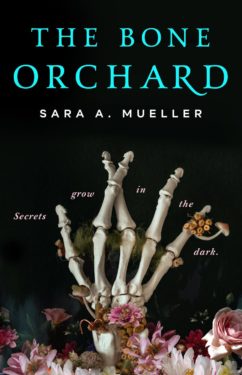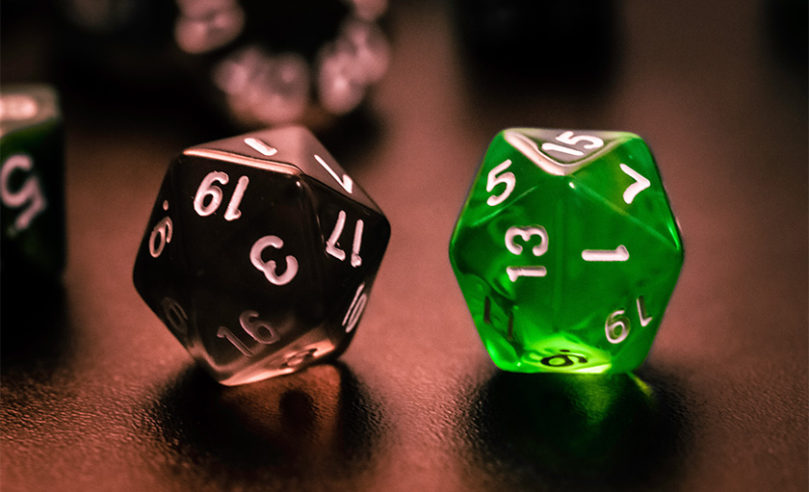 Writers draw inspiration from many areas—fan fiction, writing groups, and even tabletop role-playing games (TTRPGs). Sara A. Mueller, author of The Bone Orchard, joins us today to discuss the similarities between writing science fiction, fantasy, and TTRPGs. Check it out here!
Writers draw inspiration from many areas—fan fiction, writing groups, and even tabletop role-playing games (TTRPGs). Sara A. Mueller, author of The Bone Orchard, joins us today to discuss the similarities between writing science fiction, fantasy, and TTRPGs. Check it out here!
By Sara A. Mueller
Everybody that tabletop role plays knows it’s as much a form of storytelling as writing fiction is, and that the two have the same essential elements – characters and plot and worldbuilding. There are a load of SFF writers who’ve taken inspiration from tabletop RPGs, and a lot of others who did and don’t admit it. And if you’re the person over there sniffing loftily because you didn’t come into SFF writing this way? Knock it the hell off, ya fun-denying killjoy. Eyes on your own work. Starting out in fiction writing is rough, and having a jumping-off point can help. TTRPGs are terrific springboards. To be clear, I’m not talking about adapting the events of a TTRPG into a novel. What’s the difference between adaptation and inspiration? Adaptation is tailoring a story to fit a different media format. Inspiration is recutting a game story into a whole new garment that’s unrecognizable. The material, and the inspiration, is at your fingertips. Why not use it?
If a whole new story sounds scary, please know that you don’t have to turn a pair of jeans into a ballgown or tuxedo jacket overnight, or even the first time. Original works of fiction take time, and thought, and no, it’s not easy. But, in the end, it’s something that you made entirely yourself, and there isn’t going to be anything else quite like it. Not even if someone else starts from the same pair of jeans.
Before we go any further, let me ask that in taking inspiration from a TTRPG, everybody holds up their right hand and swears to follow the one immutable rule – Thou shalt NEVER. EVER. use someone else’s character in a book without their express permission, and even then… don’t. What you-as-writer end up doing with that character isn’t going to be what the original player would intend, and it shouldn’t be. Feelings can get hurt. Make up a different character, with a different background and backfill your friend’s character slot. It will change the story, but that’s a good thing. Change is the point.
And if you want to write a story inspired by your own player character… (Oh, we still have the sniffer with us…? Sniffer, march your un-supported superiority complex right the hell outta here. Git.) Okay! We’re at your character! The one you love! You made them, and found some kind of joy in playing them, or you wouldn’t want to write more about them. Start by changing their name. Find baby names resources, draw letter tiles from a word game… whatever. A change of character name can help to incrementally move your expectations away from the original character-as-PC, and let you play more freely with the character-as-protagonist. At first, the newly-renamed character may be much like the original, but a new character name may make it easier for your brain to accept new ideas about that character.
Change the world. It’s ea… no, it really isn’t. I know. So start with the window dressing. The bones of plot are the same in plenty of different kinds of SFF, so for the moment don’t worry about them. Going from horses to space ships or from planes to pegasi can change the tenor of a world not because it changes the plot elements – we’re lookin’ at you, samurai western space fantasy stories – but because it offers different worldbuilding opportunities. Even if people recognize a story’s base structure, new costumes and settings can make for just as much fun. Swap tech for magic, or swap out magic for mental powers. Whatever you’ve got to begin with, go to something else.
Now you have the trappings for your world. You can start to look at ways to tweak it into something newer and more unique. A little more or less magic. A little more or less technology. Or change the requirements for either of those things. Magic, mental powers, super powers, tech… Mix and match. Matching stripes and polkadots is a challenge, but it’s not impossible. There are plenty of snappy pinstriped suits that look great with the right spotted tie.
Time to face your plot. Plot can be thin to the point of gauze in a lot of TTRPGs. This is where you get to be your own game master. Write an adventure that’s going to matter to your shiny newer-by-the-page protagonist(s). This time it isn’t a random adventure to go along with because it’s what others are doing. Go with a plot with more internal boning and layers than most group TTRPGs will support. Make it personal. Make it hurt. Really dig into the character(s) so you can abuse the livin’ snot out of them. Is it a moral necessity to solve a crime or stand up to an injustice? Is it a job for rent money that’s gonna go heinously wrong, or a friend that’s in trouble, or can the character(s) save their own neck(s)? Do they want to build an empire? Why? I mean, cool, but empire building is a lot of work. What nasty conjunction of fate and events is going to force the character(s) get off their butt(s)? You made the character and played them a lot. You already know this one.
Set up the problem and then follow the new characters, or newly named characters, by plotting or discovery writing or a combination of both. You can always try another method if the first one doesn’t work. I like a generalized idea of what outcome I’m trying to work toward, even if that changes along the way. (Reader, it almost always changes along the way.) Whether you know where you’re going or not, you do whatever works for you-as-writer to get you all the way through to the end. If you get stuck in the middle, back up two or three chapters and for a place that your characters can do something else. If that doesn’t work, swap to plotting or discovery writing, whichever you weren’t doing, and try that to see if it gets you going again.
Was there a cool thing you wish you’d thought to do that one time? Would these characters do something the original counterparts didn’t? Might they find, or have the inability to find, certain information? The outcome might be exactly the same, but the plot they travel can and should shift. If there’s a choice to be made between easier or harder plot-paths, nine times out of ten ‘harder’ is the way to go as long as the characters get to a satisfying end. And if the ending changes as you go? That’s fine. We’re trying to make the best story we can. If you’ve thought of a better, cooler ending? Use that one.
Over the course of the new debacle you’ve inflicted on the character(s), you’re going to get to tell people, in judiciously measured tidbits, why they can’t do anything else but engage with this new plot. Show off their internal thoughts, hopes, courage, fears, the sweetheart they left behind… this time you get to put the emotion on stage where people can see it, no soliloquy required.
So go ahead. Take your favorite TTRPG apart at the seams and break out some cool new fabric for the gaps. Get going with the rivets, lace, armor, or whatever suits you. I won’t lie, the first time will probably be a disaster, but you can always rework it. Writing is forgiving that way. You can take the whole thing back apart. Or maybe you trunk that first disaster and try again and take comfort that at least you got some skill levels out of it. Writing is like that. You level up by doing it. You might only manage the story-equivalent of cut-off shorts the first time. Maybe the next time you figure out a basic skirt, or maybe you make a whole spacesuit. If your heart is set on a literary ballgown or tuxedo, go for it. You already have all the material, and you can level up as you go along. Consider this whole new creation a quest, and the words ‘the end’ as your quest reward. The inspiration is right there.
Sara A. Mueller is the debut novelist of The Bone Orchard, on sale from Tor Books now.
Order The Bone Orchard Here:












Having been at a v-TTRPG convention this weekend, we were having a discussion about how so many of the skills that make people great writers also make them quite good GMs, and vice versa. And we’re not surprised we have people coming out of our community and making waves in genre writing. Even the people who inspired the games we play were inspired by other people. You learn a lot world building for RPGs and finding plots that are coherent and you learn So Much about what doesn’t work. You get a lot of immediate feedback cuz the person sitting across from you is wincing. On some level I think it’s much simpler low level version of reading a lot of slush piles. Anyway I’m proud of my ttrpg community. We have come a hell of a long way in the last 30 years.
Don’t forget that GM-to-novelist is a hoary-bearded tradition in TTRPG, either. (*cough*, Gary Gygax, *cough-cough*) NOTE: 30 years? Nope. I’ve been playing TTRPG since December of ’76, and I’ve gamed with people who were part of the playtesting groups three or four years prior to that.
For some of the 2nd- or 3rd- generation games, the game designers were building their game and related fiction side-by-side, or perhaps tangentially, as they trotted along with rayguns, swords, and magic wands in hand.
In my own writing efforts, I’ve built worlds as a GM that I will only ever create game scenarios for AND I’ve written material as an author that I’ll never introduce to gamers as a scenario. Some things that “work” in one field just don’t translate that well to the other. It’s the BEST, that I can use in either fashion, that I am trying to concentrate on currently — but I’ll still trot along the trails of my primary TTRPG crossroads-of-everything setting regularly while hatching other plot bunnies and razorwings…
There’s some decent evidence that Firefly was based on Traveller, Stargate on Fringeworthy, and X-Files on Bureau 13. So the cross-pollination between RPGs and SF writing (at least, Hollywood SF writing) has a long history.